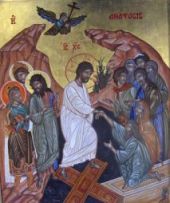This is quite long but I’ve been wanting to transcribe it for a while and I’d done enough packing for one day today. It’s an extract from Father Louth’s lecture on “Maximus the Confessor and Modern Science” that I mentioned a while ago.
At the beginning of his Orthodox Dogmatic Theology, the first volume of which has been translated into English as The Experience of God, [Father Dumitru Stăniloae] has this to say:
Some of the Fathers of the Church have said that man is a microcosm, a world which sums up in itself the larger world. Saint Maximus the Confessor remarked that the more correct way would be to consider man as a macrocosm because he is called to comprehend the whole world within himself, as one capable of comprehending it without losing himself, for he is distinct from the world. Therefore man effects a unity greater than the world exterior to himself whereas, on the contrary, the world as cosmos, as nature, cannot contain man fully within itself without losing him, that is, without losing in this way the most important reality, that part which more than all others gives reality its meaning. The idea that man is called to become ‘the world writ large’ has a more precise expression, however, in the term macroanthropos. The term conveys the fact that in the strict sense the world is called to be humanised entirely, that is, to bear the entire stamp of the human, to become panhuman, making real through that stamp a need that is implicit in the world’s own meaning, to become in its entirety a humanised cosmos in a way that the human being is not called to become nor can ever fully become, even at the farthest limit of his attachment to the world where he is completely identified with it, a cosmosised man. The destiny of the cosmos is found in man not man’s destiny in the cosmos. This is shown, not only by the fact that the cosmos is the object of human consciousness and knowledge and not the reverse, but also by the fact that the entire cosmos serves human existence in a practical way.
These words of Father Dumitru Stăniloae sum up I think, more than Maximus himself ever does, the core of Maximus’ understanding of the analogy between the universe and the human person. The idea of the human as microcosm is of course an old one and in drawing on it Maximus would not have been thought to have been saying anything exceptional. It’s perhaps worth pausing on that for a moment. The ideas that Maximus draws on, the philosophical, anthropological, cosmological and medical ideas that he draws on in his understanding of the human person and the cosmos, would not have seemed strange to his contemporaries. His use of them, however, would have seemed striking if not actually strange.
If we are going to learn from Maximus, we shall have to think through his ideas again using concepts that are contemporary to us, just as he used concepts that were contemporary to him. If we simply attempt to revive an ancient cosmology we shall probably lose Maximus in the process. And the way Father Stăniloae restates the insight of Saint Maximus sees to me to be a step in the right direction. Because of the position of the human in the cosmos, ultimately because the human is created in the image of God, the human person is a bond of the cosmos, or, looked at another way, the human person is priest of the cosmos. It is through the human that the cosmos relates to God. And it is in the human that the cosmos finds its meaning. But, conversely, if the human person fails to fulfil such a priestly, interpretative, relating role, then that failure is not just a personal, individual failing, it is a failing with cosmic consequences.
We are becoming dimly aware of this as we realise how human behaviour that fails to recognise the integrity of God’s creation, its inherent value, its inherent beauty, and treats it simply as so much material to be consumed, how such behaviour is more than simply self destructive, or destructive of human society, but threatens the ordered beauty of the cosmos itself.
Saint Maximus goes even further than that. Fallen human activity, Saint Maximus suggests, threatens the very meaning of the cosmos, insofar as that meaning is perceived by and articulated through human beings. The cosmos ceases to be an ordered beautiful structure, an idea implicit in the very world ‘cosmos’ which in Greek suggests something ordered and beautiful, and becomes obscure, dark, dangerous, at least to humans, a forest of symbols no longer clearly disclosing the divine but difficult to interpret and easily misunderstood. The perfect fit, as it were, between unfallen humanity and the cosmos becomes awkward, ill-fitting, painful and mutually harmful.
Now this is one way in which Maximus understands the coherence of the universe, a sort of co inherence between the human and the cosmos more than simply a sympathy between all the different part of the cosmos, though that is implied too, but a sympathetic togetherness that is focussed on the human person for good or ill.
Father Andrew Louth, podcast, Maximus the Confessor and Modern Science.




